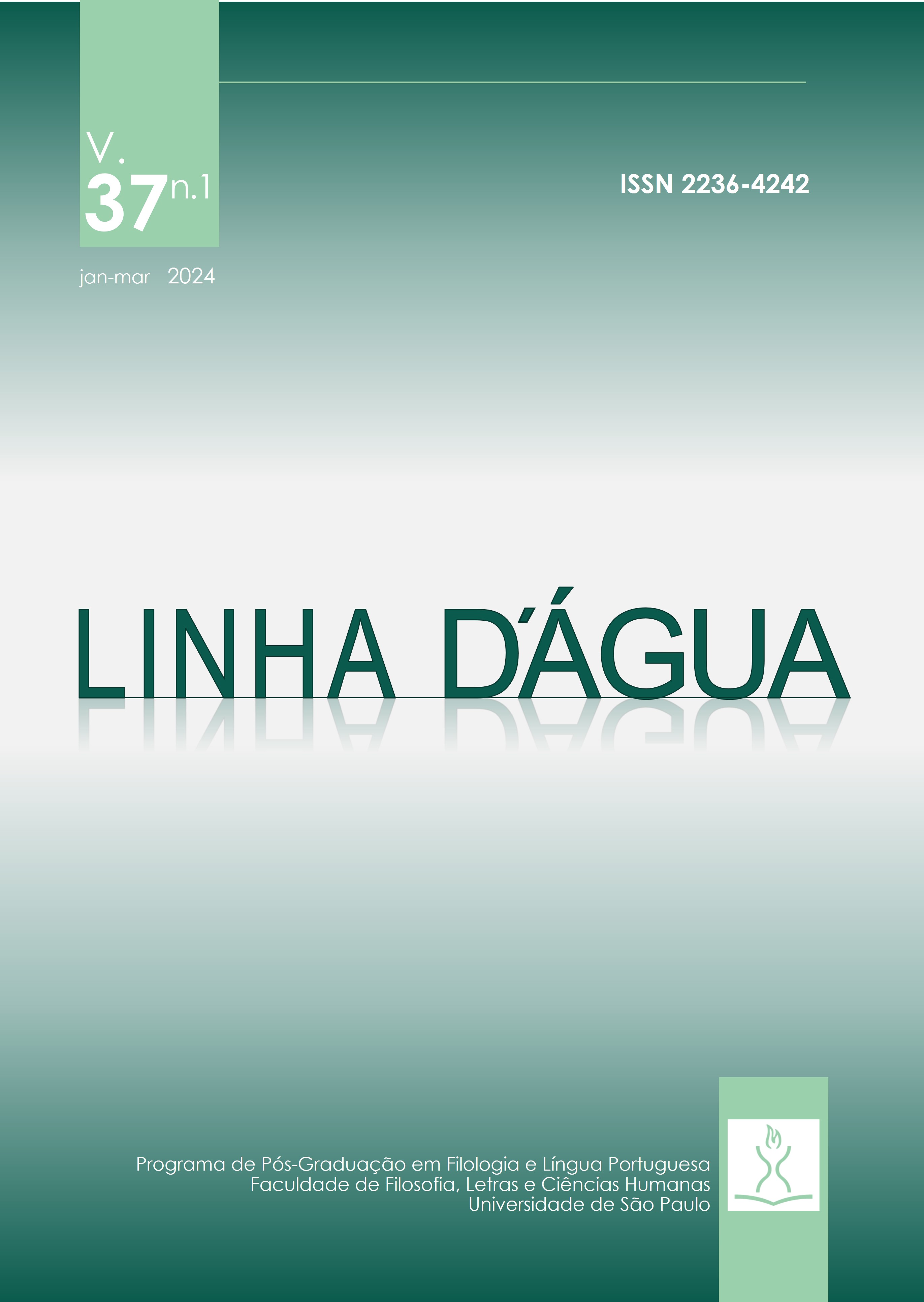O contributo dos estudos discursivos na construção de mensagens publicitárias nos meios digitais: análise da comunicação de uma marca de água de mesa
DOI:
https://doi.org/10.11606/issn.2236-4242.v37i1p149-169Palavras-chave:
Discurso, Publicidade, Media, Oportunidades, DesafiosResumo
A publicidade encontrou, nos novos meios digitais, oportunidades e desafios. Nessas formas de comunicar, reconhecemos complexidade, variedade, aumento do imediatismo e novos dialogismos. Instituições e marcas tomaram consciência do impacto desses novos meios e da necessidade de uma comunicação mais eficiente. Os estudos do discurso constituem um instrumento de análise das mensagens promocionais nos meios tradicionais e digitais, mas também contribuem para que instituições e marcas utilizem esses meios de formas eficientes e eticamente responsáveis. Revisitam-se três abordagens para aferir o seu espectro de análise: olhar para a comunicação como (1) interação social, reveladora das relações de poder, processos culturais e práticas discursivas (análise crítica do discurso); (2) compreender a arquitetura retórica do tecido textual, que possibilita um discurso argumentativo, persuasivo e eficaz (retórica e argumentação); (3) examinar o contributo da linguística pragmática para a compreensão da linguagem na interação criada nos novos meios (princípios da conversação e implicatura).
Downloads
Referências
ARISTÓTELES. The rhetoric and the poetics of Aristotle. Tradução W. Rhys Roberts. Nova Iorque: The Modern Library, 1984.
ATHERTON, J. Social media strategy: a practical guide to social media marketing and customer engagement. Londres: Kogan Page, 2021.
AUSTIN, J. L. How to do things with words. Oxford: Oxford University Press, 1962.
BELCH, G. E.; BELCH, M. A. Advertising and promotion: an integrated marketing and communication perspective. 11. ed. Nova Iorque: McGraw-Hill, 2018.
BOUVIER, G. What is a discourse approach to Twitter, Facebook, YouTube and other social media: connecting with other academic fields? Journal of Multicultural Discourses, v. 10, n. 2, p. 149-162, 2015. DOI: https://doi.org/10.1080/17447143.2015.1042381
CHARAUDEAU, P. L’argumentation dans une problématique de l’influence. Revue Argumentation et Analyse du Discours, (AAD), n. 1, p. 1-17, 2008. DOI: https://doi.org/10.4000/aad.193
CLULEY, R. Essentials of advertising. Londres: Kogan Page, 2017.
COOK, G. The discourse of advertising. Londres e Nova Iorque: Routledge, 2001.
DUFF, B. R. L.; FABER, R. J.; NAN, X. Coloring outside the lines: suggestions for the future of advertising theory. In: RODGERS, S.; THORSON, E. (Eds.) Advertising theory. 2. ed. Nova Iorque e Abingdon: Routledge, 2019, p. 18-31.
EVANS, N. et al. Disclosing Instagram influencer advertising: the effects of disclosure language on advertising recognition, attitudes, and behavioral intent. Journal of Interactive Advertising, v. 17, n. 2, p. 138-149, 2017. DOI: https://doi.org/10.1080/15252019.2017.1366885
FAIRCLOUGH, N. Discourse and social change. Cambridge: Polity Press, 1992.
FAIRCLOUGH, N. Critical discourse analysis: the critical study of language. Londres & Nova Iorque: Routledge, 1995.
FAIRCLOUGH, N. Analysing discourse: textual analysis for social research. Nova Iorque e Londres: Routledge, 2003.
FEN, Y.; CHEN, H.; KONG, Q. An expert with whom I can identify: the role of narratives in influencer marketing. International Journal of Advertising, v. 40, n. 7, p. 972–993, 2021. DOI: https://doi.org/10.1080/02650487.2020.1824751
FONSECA, J. O lugar da pragmática na teoria e análise linguísticas. Máthesis, n. 3, p. 35-42, 1994. DOI: https://doi.org/10.34632/mathesis.1994.3708
GEORGAKOPOULOU, A. (S)mall stories online: the intersection of affordances and practices. In: HANDFORD, M.; GEE, J.P. (Eds.) The Routledge handbook of discourse analysis. 2. ed. Abingdon e Nova Iorque: Routledge, 2023, p. 441-453.
GOFFMAN, E. Gender advertisements. Londres: Harper & Row, 1979.
GRICE, P. Logic and conversation. In: COLE. P.; MORGAN, J. J. (Eds.) Syntax and semantics 3: Speech Acts. Nova Iorque: Academic Press, 1975, p. 41–58.
HARDY, J.; POWELL, H.; MacRURY, I. The advertising handbook. 4.ed. Abingdon e Nova Iorque: Routledge, 2018.
HE, J.; SHAO, B. Examining the dynamic effects of social network advertising: A semiotic perspective. Telematics and Informatics, n. 35, p. 504–516, 2018. DOI: https://doi.org/10.1016/j.tele.2018.01.014
ISMAGILOVA, E. et al. The effect of electronic word of mouth communications on intention to buy: a meta-analysis. Information Systems Frontiers, n. 22, p. 1203–1226, 2020. DOI: https://doi.org/10.1007/s10796-019-09924-y
KINGSNORTH; S. Digital marketing strategy: an integrated approach to online marketing 3. ed. Londres: Kogan Page, 2019.
LAWES, R. Using semiotics in marketing: how to achieve consumer insight for brand growth and profits. Londres: Kogan Page, 2020.
LEECH, G. English in advertising: a linguistic study of advertising in Great Britain. Londres: Longman, 1966.
MCSTAY, A. A qualitative approach to understanding audience's perceptions of creativity in online advertising. The qualitative report, v. 15, n. 1, p. 37-58, 2010. DOI: https://doi.org/10.46743/2160-3715/2010.1139
MYERS, G. Ad worlds: brands, media, audiences. Londres: Arnold, 1999.
MYERS, G. Words in ads. Londres: Edward Arnold, 1994.
RIPLEY, M. L. Argumentation theorists argue that an ad is an argument. Argumentation, v. 22, n. 4, p. 507-519, 2008. DOI: https://doi.org/10.1007/s10503-008-9102-2
RIPLEY, M.; GOWING, M. P. Argumentation and emotional cognition in advertisements. OSSA Conference archive, n. 19, p. 1-5, 2011. DOI: https://doi.org/10.17576/pengurusan-2021-63-05
RODRIGUEZ, M. Brand storytelling: put customers at the heart of your brand story. Londres: Kogan Page, 2020.
RUIZ RUIZ, J. El discurso implícito: aportaciones para un análisis sociológico. Revista Española de Investigaciones Sociológicas, v. 146, p. 171-190, 2014. DOI: https://doi.org/10.5477/cis/reis.146.171
SCHRÖDER, T. Aspects of language advertising online. In: BEDIJS, K.; MAAΒ, C. (Eds.) Manual of Romance languages in the media. Berlin: Walter de Gruyter, 2017, p. 110-129.
SHAREEF, M. A. et al. Social media marketing: comparative effect of advertisement sources. Journal of Retailing and Consumer Services, v. 46, p. 58–69, 2019. DOI: https://doi.org/10.1016/j.jretconser.2017.11.001
SIMÕES, E. The language of advertising. In: LEUNG, C.; STREET, B. V. (Eds.) The Routledge companion to English studies. Londres e Nova Iorque: Routledge, 2014, p. 505-515.
SIMÕES, E. Discourse(s) in advertising. In: HANDFORD, M.; GEE, J.P. (Eds.) The Routledge handbook of discourse analysis. 2. ed. Abingdon e Nova Iorque: Routledge, 2023, p. 525-538.
THORSON, E.; RODGERS, S. Advertising theory in the digital age. In: RODGERS, S.; THORSON, E. (Eds.) Advertising Theory. 2. ed. Londres: Routledge, 2019, p. 3-17.
TUNA, S. A promoção de jovialidade: a construção de um discurso e argumentação persuasivos. Redis: Revista de estudos do discurso, n. 8, p. 200-216, 2019. DOI: https://doi.org/0.21747/21833958/red8a9
VAN DIJK, T.A. Critical discourse analysis. In: TANNEN, D.; HAMILTON, H. E.; SCHIFFRIN, D. (Eds.) The Handbook of discourse analysis, 2. ed. Londres: Wiley, 2015, p. 466-485.
VAN EEMEREN, F. H.; ANDONE, C. Argumentation and communicative practices. In: ROCCI, A.; SAUSSURE, L. (Eds.) Verbal communication. Berlim: Walter de Gruyter, 2016, p. 245-268.
VAN EEMEREN, F. H. Argumentative style: a complex notion. Argumentation, v. 33, n. 2, p. 153–171, 2019. DOI: https://doi.org/10.1007/s10503-019-09478-y
WALTON, D. Anticipating objections in argumentation. In: RIBEIRO, H. J. (Ed.) Rhetoric and argumentation in the beginning of the 21st century. Coimbra: Imprensa da Universidade de Coimbra, 2009, p. 87-109.
WILLIAMSON, J. Decoding advertisements. Londres: Marion Boyars, 1978.
WILSON, R. T.; TILL, B. D. Managing advertising in non-traditional environments: a message processing framework. In: RODGERS, S; THORSON, E. (Eds.) Advertising theory. 2.ed. Abingdon e Nova Iorque: Routledge, 2019, p. 109-123.
WODAK, R.; MEYER, M. (Eds.) Methods in critical discourse analysis. Londres: Sage, 2001.
YAKOB, F. Paid attention: innovative advertising for a digital world. Londres: Kogan Page, 2022.
YUEN, C. Y. The construal of ideational meaning in print advertisements. In: O’HALLORAN, K. L. (Ed.) Multimodal Discourse Analysis: systemic-functional perspectives. Londres e Nova Iorque: Continuum, 2004, p. 163-195.
Publicado
Edição
Seção
Licença
Direitos autorais (c) 2024 Elsa Simões, Sandra Tuna

Este trabalho está licenciado sob uma licença Creative Commons Attribution-NonCommercial 4.0 International License.
A aprovação dos manuscritos implica cessão imediata e sem ônus dos direitos de publicação para a Linha D'Água. Os direitos autorais dos artigos publicados pertencem à instituição a qual a revista encontra-se vinculada. Em relação à disponibilidade dos conteúdos, a Linha D'Água adota a Licença Creative Commons, CC BY-NC Atribuição não comercial. Com essa licença é permitido acessar, baixar (download), copiar, imprimir, compartilhar, reutilizar e distribuir os artigos, desde que para uso não comercial e com a citação da fonte, conferindo os devidos créditos autorais à revista.
Nesses casos, em conformidade com a política de acesso livre e universal aos conteúdos, nenhuma permissão é necessária por parte dos autores ou do Editor. Em quaisquer outras situações a reprodução total ou parcial dos artigos da Linha D'Água em outras publicações, por quaisquer meios, para quaisquer outros fins que sejam natureza comercial, está condicionada à autorização por escrito do Editor.
Reproduções parciais de artigos (resumo, abstract, resumen, partes do texto que excedam 500 palavras, tabelas, figuras e outras ilustrações) requerem permissão por escrito dos detentores dos direitos autorais.
Reprodução parcial de outras publicações
Citações com mais de 500 palavras, reprodução de uma ou mais figuras, tabelas ou outras ilustrações devem ter permissão escrita do detentor dos direitos autorais do trabalho original para a reprodução especificada na revista Linha D'Água. A permissão deve ser endereçada ao autor do manuscrito submetido. Os direitos obtidos secundariamente não serão repassados em nenhuma circunstância.
Dados de financiamento
-
Fundação para a Ciência e a Tecnologia
Números do Financiamento UIDB/00661/2020











